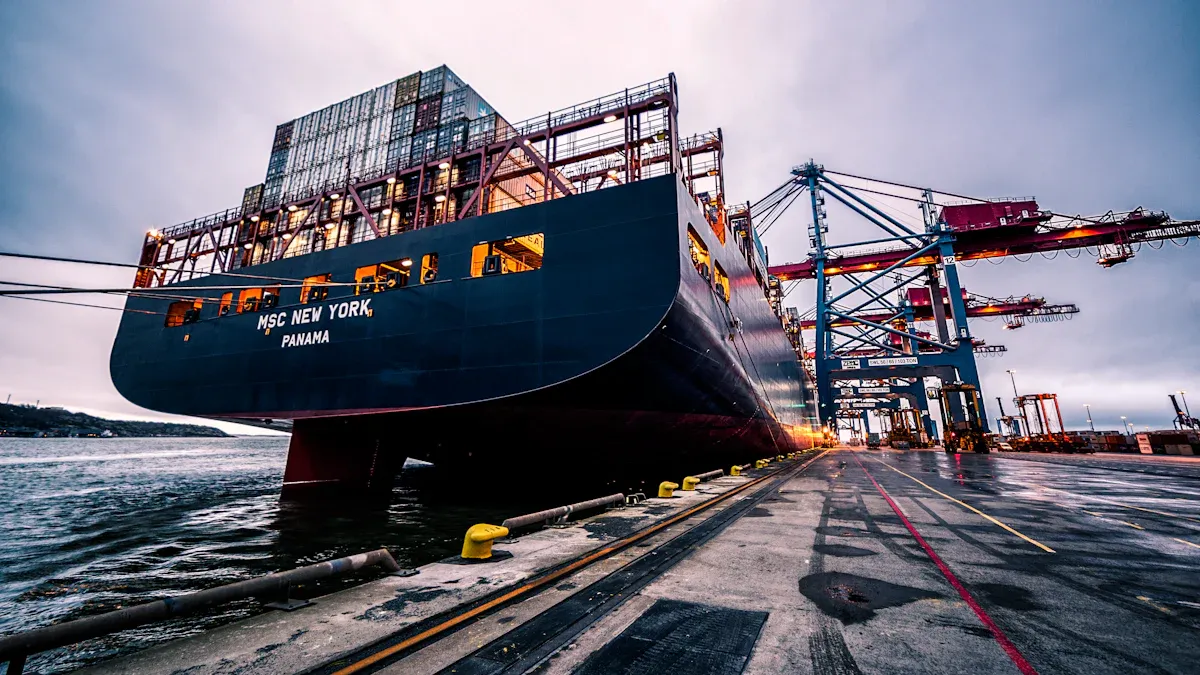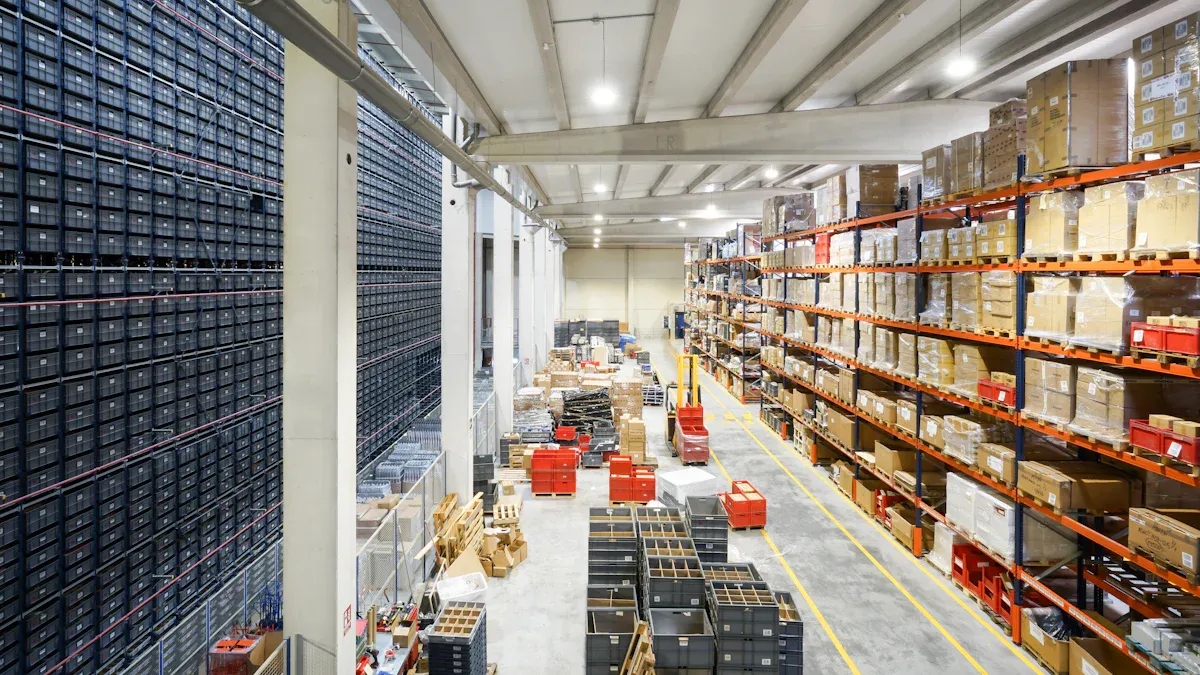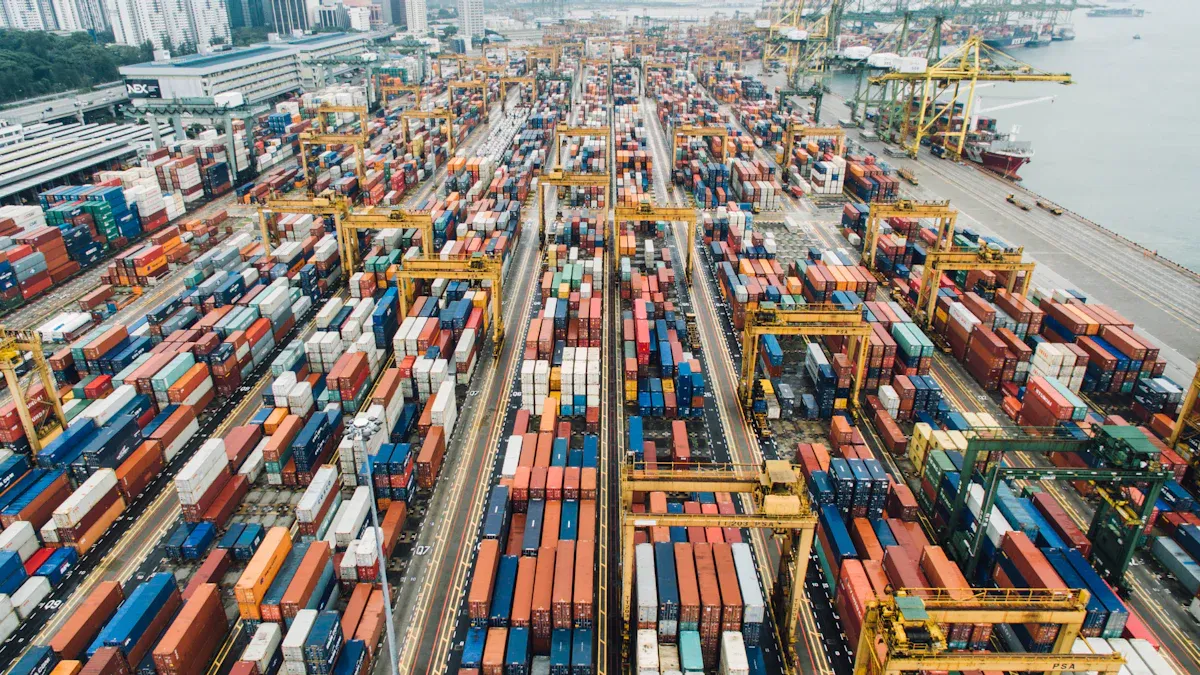Contract Logistics Services Explained in Simple Terms

Contract logistics services explained in simple terms means you let an expert company handle your storage, shipping, and order tasks for you. These services help you save time, cut costs, and keep your products moving smoothly. You can see how popular this solution is by looking at the market:
The global contract logistics market reached USD 264.3 billion in 2024.
Experts expect it to grow to USD 519.21 billion by 2032.
The industry grows at nearly 7% each year.
Key Takeaways
Contract logistics services let experts manage your storage, shipping, and order tasks, saving you time and money.
These services offer flexibility, allowing you to scale your logistics operations up or down based on your business needs.
Using advanced technology, contract logistics providers ensure accurate inventory management and real-time tracking of shipments.
Outsourcing logistics allows you to focus on your core business activities while experts handle the complexities of supply chain management.
Choosing contract logistics can improve efficiency, reduce errors, and enhance customer satisfaction through timely deliveries.
Contract Logistics Services Explained

What Are They?
You might wonder what contract logistics services explained really means for your business. In simple terms, contract logistics is when you hire a company to take care of your supply chain tasks. This company manages everything from storing your products to delivering them to your customers. You sign a long-term agreement, and the provider uses their own warehouses, trucks, and staff to handle your goods. You do not need to worry about hiring extra workers or renting space. The provider takes care of moving products from the factory to the warehouse and then to your customers. This setup lets you focus on your main business while experts handle the details.
Contract logistics services explained: You outsource your storage, shipping, and order management to a trusted partner who uses their resources to keep your supply chain running smoothly.
Key Features
Contract logistics services explained include several important features that help your business run better. Here are the main components you get when you use these services:
Inventory management
Order fulfillment
Transportation and distribution
Last-mile delivery
Returns management
These features work together to make sure your products reach customers quickly and safely. The provider uses advanced technology to track shipments and manage inventory. You get updates about your orders and can see where your products are at any time. Providers also focus on quality by using strict standards and improving their processes regularly.
Method | Description |
|---|---|
Technology Integration | Uses smart systems to make work faster and avoid mistakes. |
Continuous Improvement | Always looks for ways to do things better. |
Operational Standards | Follows clear rules to keep service reliable and high-quality. |
You benefit from flexible agreements. The provider can adjust services to fit your needs, whether you need more storage space or faster delivery. You also get help with returns and after-sales support. This makes your supply chain more efficient and helps you save money.
Who Uses Them?
Many types of businesses use contract logistics services explained in this way. You see these services in industries like retail, healthcare, automotive, and food. Companies that sell products online or in stores need help managing inventory and shipping. Manufacturers use these services to move parts and finished goods. Healthcare organizations rely on contract logistics for safe delivery of sensitive items.
Sector | Description |
|---|---|
Retail | Needs fast inventory management and delivery. |
Consumer Products | Wants smooth supply chains for goods. |
Industrial and Automotive | Depends on reliable shipping for parts and vehicles. |
Healthcare | Requires careful handling of medical products. |
Food and Beverage | Needs to manage perishable items quickly. |
Grocery and Food Service | Relies on timely delivery and inventory control. |
Logistics | Supports other sectors with efficient supply chains. |
You might choose contract logistics if you want to make your supply chain simpler and more reliable. These services help you make better decisions about storage and shipping. You get more visibility and control over your operations. If your business needs to grow or handle more orders, contract logistics can scale up to meet your needs.
How Contract Logistics Works
Warehousing
You benefit from warehousing solutions that keep your products safe and organized. Contract logistics providers design warehouses to move goods smoothly through the supply chain. You can choose from options like cold storage for perishable items or secure areas for valuable products. Providers offer scalable space, so you never pay for more than you need.
Here is a quick look at common warehousing services:
Service Type | Description |
|---|---|
Warehousing services | Expertly designed warehouses ensure seamless product flow through the supply chain. |
Distribution services | Integrates with warehouses to ensure products reach their final destinations efficiently. |
Value added services | Offers customization options like co-packing and labelling to save time and costs. |
Cold Storage | Provides modern facilities for cold cargo needs, including services like blast freezing. |
Providers use customized storage solutions and efficient inventory management to maximize space. You work together to develop strategies that fit your needs.
Inventory Management
You track your products with advanced technology. Providers use tools like IoT, RFID, barcode scanning, and predictive analytics to keep inventory accurate. You see real-time updates through online portals and cloud-based warehouse management systems.
You get:
Cycle counting programs for accuracy
Real-time tracking with GPS and RFID
Integration with your ecommerce and ERP systems
Inventory accuracy rates up to 99.9%
Your inventory stays organized, and you always know what you have in stock.
Transportation
You rely on dedicated resources to deliver your goods on time. Providers use real-time tracking to monitor shipments and address delays quickly.
Some strategies include:
Strategy | Description |
|---|---|
Dedicated Resources | Providers assign teams to ensure timely and accurate deliveries. |
Real-Time Tracking | You monitor delivery progress and solve problems before they affect your customers. |
Risk Mitigation | Providers use backup plans to prevent delivery disruptions. |
Compliance Audits | Regular checks keep deliveries reliable and meet your standards. |
Geofencing protocols help keep deliveries on track and prevent wasted resources.
Value-Added Services
You can choose extra services that make your supply chain more efficient. Providers offer labelling, kitting, product customization, and quality controls.
Here are some examples:
Labelling and tagging
Kitting and assembly
Garments on hangers
Re-packing
Functional testing
These services help you save time and money. You get products ready for sale faster and improve customer satisfaction.
Tip: Value-added services let you focus on your main business while experts handle the details.
Technology Integration
You benefit from technology that connects every part of your supply chain. Providers use real-time tracking, data analytics, and cloud deployment to keep operations smooth.
Common software platforms include Lexagle, Icertis, Agiloft, CobbleStone Software, and Summize.
Technology integration gives you:
Precise monitoring of inventory and shipments
Insightful reports for better decisions
Secure and flexible data storage
Fast communication with all partners
Contract logistics services explained in this section show how technology makes your supply chain smarter and more reliable.
Comparison with Other Models
Contract Logistics vs. 3PL
You may wonder how contract logistics compares to third-party logistics (3PL). Both models help you manage your supply chain, but they have important differences. Contract logistics often gives you a deeper, more specialized focus. You sign a long-term agreement, and the provider dedicates resources just for your business. In contrast, 3PL services offer broader, more flexible solutions. They use shared infrastructure and usually work with shorter contracts.
Here is a table to help you see the main differences:
Factor | Contract Logistics | 3PL |
|---|---|---|
Scope | Specialized/deep focus | Broad/integrated services |
Cost model | Fixed/management fees | Transactional/variable |
Contract length | Long-term | Shorter-term |
Ideal user | High-volume/complex needs | Fluctuating demand |
Asset dedication | Dedicated resources | Shared infrastructure |
When you look at costs, contract logistics works best if your business ships large volumes. You pay a fixed fee or management fee, which can save money over time. 3PL services use per-unit or activity-based pricing, which helps smaller businesses keep costs flexible.
Aspect | Contract Logistics | 3PL Services |
|---|---|---|
Cost Effectiveness | More cost-effective for small firms | |
Pricing Models | Cost-plus, gain-sharing, fixed fee | Per-unit, activity-based pricing |
Ideal Usage | Over $500,000 annual spend | When variable costs are preferred |
In-House vs. Outsourced
You can choose to manage logistics yourself or outsource it. In-house logistics gives you total control. You talk directly to customers and monitor every delivery. This approach reduces miscommunication and lets you respond quickly. However, you need to invest in trucks, warehouses, and staff. This can get expensive and requires more management.
Outsourcing logistics reduces your workload. You save money on operations and gain access to advanced technology. The provider handles most tasks, but you give up some control. Sometimes, you may face miscommunication or higher costs.
Advantages of In-House Logistics:
You control every step of delivery.
You communicate faster with customers.
You avoid third-party confusion.
Disadvantages of In-House Logistics:
You pay more for staff and equipment.
You need to manage a larger team.
You risk your brand if deliveries fail.
Advantages of Outsourced Logistics:
You reduce your management tasks.
You save on logistics costs.
You use the latest logistics technology.
Disadvantages of Outsourced Logistics:
You have less control over deliveries.
You may face miscommunication.
You might pay more than expected.
Tip: Managing logistics in-house needs investment in software and skilled workers. Outsourcing gives you access to expertise and technology without high upfront costs.
When to Choose Each
You should think about your business size, shipment volume, and supply chain complexity. If you run a large company with steady, high-volume shipments, contract logistics or in-house solutions may fit best. Smaller or seasonal businesses often benefit from 3PL services, which offer flexibility and lower upfront costs.
Consider these points when making your choice:
Seasonal businesses can use outsourced logistics for on-demand help.
Growing companies can scale up quickly with 3PL or contract logistics.
Large corporations may afford in-house logistics, but small firms often save money by outsourcing.
You should also compare costs, check provider expertise, and use technology to improve efficiency. Focus on your main business strengths and review your logistics performance often. If your supply chain is complex or you lack logistics knowledge, a 3PL or contract logistics provider can help you succeed.
Benefits for Businesses
Efficiency
You want your business to run smoothly. Contract logistics services explained help you do that by making every step faster and more accurate. Providers use smart systems to track your products and shipments. You get updates in real time. Mistakes happen less often because experts handle your orders and inventory.
You save time on packing and shipping.
You avoid delays with quick problem-solving.
You see fewer errors in your deliveries.
Tip: Efficient logistics mean happier customers and lower costs for you.
Scalability
Your business can grow or shrink at any time. You need a supply chain that keeps up. Contract logistics providers offer flexible solutions. You add more storage space or delivery options when you need them. You do not pay for unused resources.
Here is how scalability works for you:
Benefit | What You Get |
|---|---|
Flexible Space | More or less warehouse room |
Adjustable Staff | Extra help during busy times |
Custom Services | New options as you expand |
You handle busy seasons or sudden growth without stress.
Expertise
You may not know every detail about shipping or inventory. Providers bring years of experience to your business. They train their teams to solve problems quickly. You get advice on best practices and new technology.
You learn from experts in logistics.
You avoid common mistakes.
You use proven methods for storage and delivery.
Note: Expert support helps you make better decisions and improve your supply chain.
Focus
You want to spend time on your main business. Contract logistics services explained let you do that. You hand off complex tasks to specialists. You use your energy to grow your brand, develop products, or serve customers.
You reduce your workload.
You spend less time on logistics.
You focus on what matters most.
Callout: Outsourcing logistics gives you more freedom to build your business.
Industry Examples

Retail
You run a retail business. You need to keep shelves stocked and deliver online orders quickly. Contract logistics helps you manage inventory in warehouses close to your customers. You use real-time tracking to see which products sell fast. Providers handle returns and restocking, so you avoid delays.
Retailers rely on contract logistics to keep products available and customers happy.
You can scale up during busy seasons. Providers add extra staff and space when you need it. You focus on sales while experts handle storage and shipping.
Automotive
You work in the automotive industry. You need parts delivered on time to factories and dealerships. Contract logistics providers set up special warehouses for your parts. They use advanced systems to track every shipment.
A premium German car maker switched to a new logistics partner for its parts warehouse. Careful planning kept deliveries smooth across Europe. The team worked together to avoid delays.
Hellmann Logistics built two centers for a top supplier. They reached 99.95% outbound quality in the first week. You see how a reliable partner improves efficiency and cuts costs.
C.H. Robinson helped a supplier speed up deliveries. Their solutions gave better control and faster response times. You benefit from timely shipments and better service.
Healthcare
You manage medical supplies. You need safe storage and fast delivery. Contract logistics providers use temperature-controlled warehouses for medicines and vaccines. They follow strict rules to keep products safe.
You track shipments with secure systems. Providers handle returns and recalls quickly. You protect patients by making sure supplies arrive on time.
Healthcare Needs | Contract Logistics Solutions |
|---|---|
Safe storage | Temperature-controlled warehouses |
Fast delivery | Dedicated transport teams |
Product tracking | Secure inventory systems |
Consumer Goods
You sell everyday products. You need to move goods from factories to stores and homes. Contract logistics services explained help you manage large volumes. Providers pack, label, and ship products for you.
You use technology to track orders and inventory. Providers adjust services as your business grows. You save money and keep customers satisfied.
Tip: Contract logistics lets you focus on product quality while experts handle delivery.
You now understand how contract logistics services work and why they matter. You can look at your business and decide if outsourcing logistics will help you save time and money. You may want to talk with a logistics provider or review your supply chain for areas to improve. Choosing the right solution gives you more control and helps your business grow. 🚀
FAQ
What is the difference between contract logistics and regular shipping?
You get more than just shipping with contract logistics. Providers manage storage, inventory, and delivery for you. Regular shipping only moves your products from one place to another.
Tip: Contract logistics covers your whole supply chain, not just transportation.
How do I know if my business needs contract logistics?
You should consider contract logistics if you want to save time, reduce costs, or handle more orders. If you struggle with storage or delivery, a provider can help you improve.
Need | Solution Provided |
|---|---|
More orders | Scalable logistics |
Cost savings | Efficient operations |
Less stress | Expert management |
Can contract logistics help my business grow?
You can grow faster with contract logistics. Providers offer flexible space and staff. You add new services as your business expands. You focus on sales while experts handle logistics.
🚀 Contract logistics lets you scale up without extra hassle.
Is contract logistics safe for sensitive products?
You get secure storage and careful handling for sensitive items. Providers use temperature-controlled warehouses and strict safety rules. You track your products at every step.
Temperature control
Secure facilities
Real-time tracking
See Also
Understanding PGL's East Coast B2B Warehousing Solutions
PGL's Proficiency in LTL and FTL Freight Services
PGL's Streamlined FCL Export Solutions Throughout America
PGL's Efficient Import Warehousing and Delivery on the East Coast
Comprehensive Ocean Export Services for FCL and LCL Shipments
